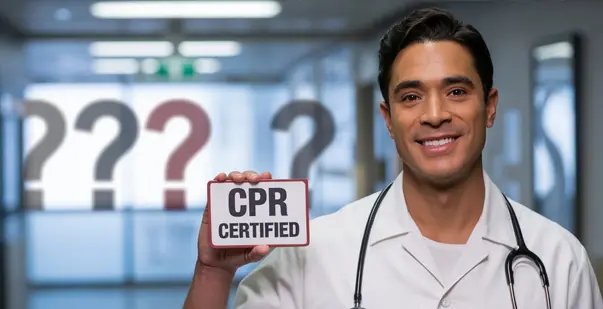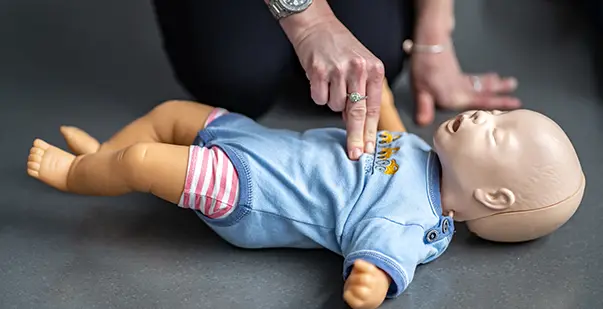Did you know that, according to Harvard Health, only 18% of Americans are currently CPR certified, even though 65% have received CPR training at some point in their lives? It means most people are not prepared to respond confidently in a cardiac emergency.
CPR skills can fade over time, and the rules can change as new research comes out. Keeping your CPR certification up to date helps you stay sharp and follow the most current guidelines, so you can give the best care when it’s needed. But how long does CPR certification last? Scroll down to learn how long your certification stays valid!
Read More: CPR Certification: A Must-Have for Educators
How Often Do You Need to Renew CPR Certification?
CPR certification usually stays valid for two years. This time frame helps make sure you still remember the key steps and can perform CPR the right way in an emergency. After two years, you’ll need to complete a renewal course to stay current and compliant with workplace or legal requirements. In fact, a study by the International Journal of Emergency Medicine found that a majority (69.7%) would agree to go for refresher training every 2 years.
Learning how long does CPR certification last will help you renew your credential on time. As a result, you keep your skills sharp, maintain your professional standing, and stay prepared to save a life when it matters most. For instance, if you work in healthcare or a high-risk environment, your employer may require you to renew your certification even sooner. In some countries, CPR certification must be renewed annually to meet stricter safety standards. Always check your local regulations and employer policies to avoid lapses in your credentials.
Read More: The 10 Benefits of CPR Certification for Construction Workers
What Factors Affect the Expiration of CPR Certification?
Now, you know exactly how long does CPR certification last. However, the timeframe isn’t universal. Several important factors determine how long your CPR certification remains valid and when you’ll need to renew it. Let’s break down those factors that affect the expiration of your CPR certification.
Type of CPR Course
The type of CPR course you complete directly impacts the level of training and the renewal process. Basic Life Support (BLS) certification typically lasts two years. Advanced courses like ACLS (Advanced Cardiovascular Life Support) and PALS (Pediatric Advanced Life Support) also have a two-year validity but require more comprehensive renewal steps, reflecting the complex skills and responsibilities expected from healthcare professionals.
Certifying Organization Policies
Each certifying organization sets its own rules for the validity of a CPR certification. In the United States, most organizations typically require renewal every two years. In Canada, the Heart and Stroke Foundation also follows a two-year renewal policy. Some European Union countries, like Germany or Sweden, may tie CPR certification validity to driving license or job requirements, which can vary from one to three years. Always check with your specific training provider and local regulations to ensure you stay compliant.
Employer or Industry Requirements
Your workplace or industry may require you to renew your CPR certification more frequently than the standard timeframe. High-risk environments like healthcare, childcare, or education often have stricter requirements to ensure staff are always prepared for emergencies. Some employers may even mandate annual refreshers, especially if regulations or accreditation standards demand it.
Regional Laws and Regulations
Local or national laws can influence how long does CPR certification last. For example, in some countries, the CPR component of a first aid certificate requires a refresher every 12 months, regardless of the overall first aid certificate’s validity. Always be aware of your region’s legal requirements to avoid lapses in certification.
Why Does CPR Certification Expire?
As lifesaving techniques evolve and your skills fade over time, staying current in CPR is important. When you maintain an up-to-date CPR certification, you ensure you’re ready to respond confidently and effectively in emergencies. Now that you know how long does CPR certification last, here are some reasons why the credential expires after a certain period:
Keeping Pace with Evolving Guidelines
CPR certification expires because lifesaving science is always advancing. Organizations like the American Heart Association review the latest research and update their guidelines every few years. When you renew, you learn about new techniques, updated compression rates, and changes in rescue protocols that could make the difference between life and death.
Retaining Skills Over Time
Even if you aced your initial training, your skills can fade surprisingly fast. Studies in NIH show that CPR proficiency starts to decline within three to six months if you don’t practice regularly. That’s why refresher courses are so important. They reinforce muscle memory and boost your confidence to act under pressure in an emergency.
Meeting Legal and Workplace Requirements
Many employers, especially in healthcare, childcare, and public safety, require you to maintain current CPR certification as a condition of employment. If your certification expires, you may be removed from duty or need to complete the full course again. Some regions require annual renewal for certain roles, reflecting a high standard of safety and preparedness.
Ensuring Public Trust and Safety
When you keep your CPR certification current by learning how long does CPR certification last, you demonstrate your commitment to safety and public health. This builds trust with your colleagues, clients, and community. It also aligns with new policy trends, such as the push for mandatory CPR training for new drivers in Europe, which aims to make lifesaving skills universal.
Bridging Training Gaps
Despite the proven benefits, only 65% of adults in the U.S. are currently CPR certified. Barriers like cost, access, and lack of employer support contribute to this gap. Renewing your certification keeps you ready and helps to close this critical public health gap. In this way, you become part of a growing movement to make CPR knowledge more widespread and accessible.
Read More: CPR Best Practices for Physicians and Nursing Staff
How to Renew CPR Certification?
You never know when there is an emergency. That’s why CPR certification should be kept up to date.
Step 1. Check Your Expiration Date
Start by reviewing your CPR certification card or online training profile to find the expiration date. CPR certifications from reputable organizations are valid for two years. Mark the renewal date in your calendar so you can begin the process on time without rushing.
Step 2. Choose an Approved Renewal Course
Enroll in a CPR renewal course from a recognized provider or an OSHA-compliant online platform. These courses are shorter than the initial training and focus on updating your knowledge. Many offer online, in-person, or blended formats to suit your schedule and comfort level.
Step 3. Complete the Refresher Training
The renewal training reviews CPR basics for adults, children, and infants, plus AED use and updates on current guidelines. The goal is to reinforce lifesaving techniques and refresh your memory. This is especially helpful if you haven’t used your CPR skills recently or want more hands-on practice.
Step 4. Pass the Required Assessment
Most renewal courses include a brief test or skills check. The pass requirement is generally 70% or higher. In blended or in-person formats, you may also perform CPR on a mannequin for evaluation. These assessments ensure you're still capable of responding effectively in emergencies.
Step 5. Receive and Save Your Updated Certification
Once you pass the training and assessment, you'll receive your renewed certification, either as a digital certificate or a physical card. Keep a copy for your records and share it with your employer if needed. Digital copies are often instantly available through your course provider’s portal.
Step 6. Set a Reminder for the Next Renewal
To avoid letting your certification expire, set a reminder for 18 to 22 months after you renew it. This gives you plenty of time to review and update your skills before it runs out. Staying current means you’ll always be ready to respond quickly and confidently in case of an emergency.
Stay Prepared Through Timely CPR Renewal!
Every year, fewer than five percent of Americans are currently CPR certified, even though bystander CPR can double or even triple a cardiac arrest victim’s chance of survival. That’s why keeping your CPR certification up to date is important. It usually lasts for two years. If it expires, you may have to take the full course again instead of a quicker and easier renewal, which can take more time and cost more. Knowing how long your CPR certification lasts helps you stay ready to act in an emergency. If you’re not sure when it expires or it’s been a while since you last practiced, now’s a good time to renew it. Online CPR courses are easy to join, work with your schedule, and teach you the latest steps you need to know.
References












